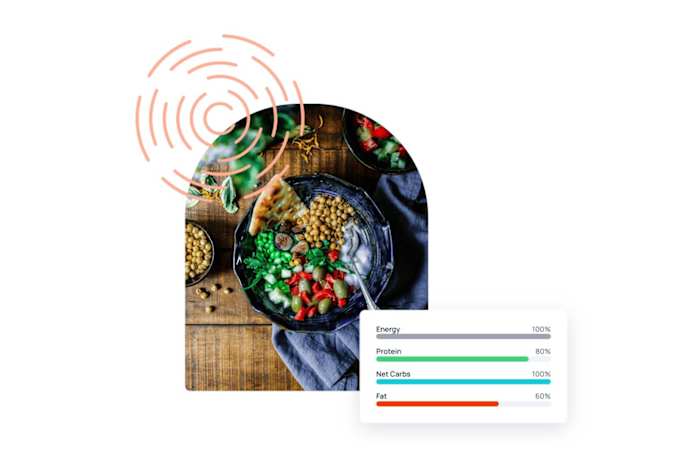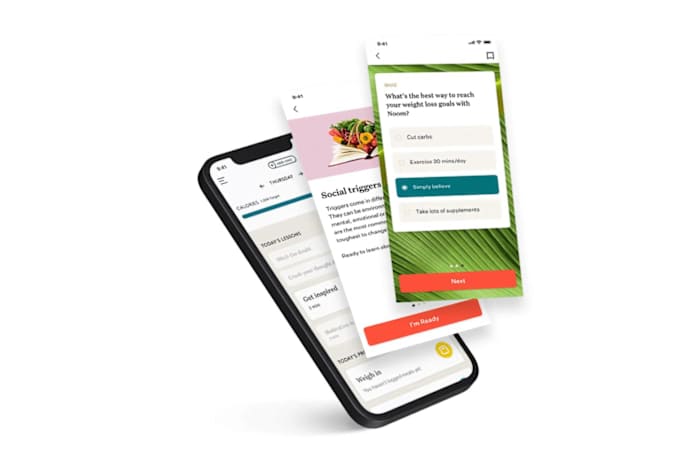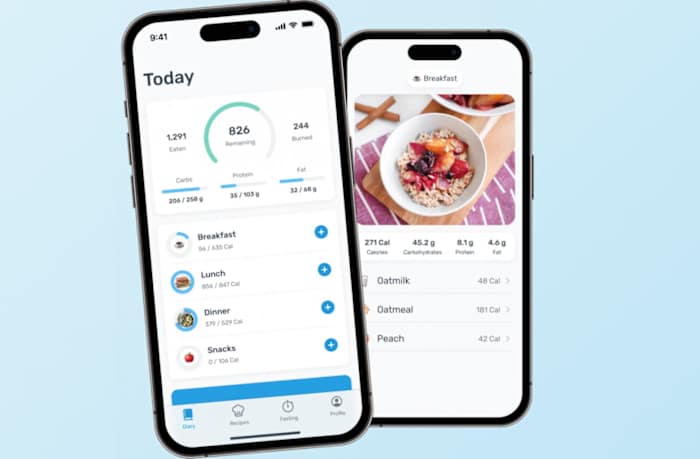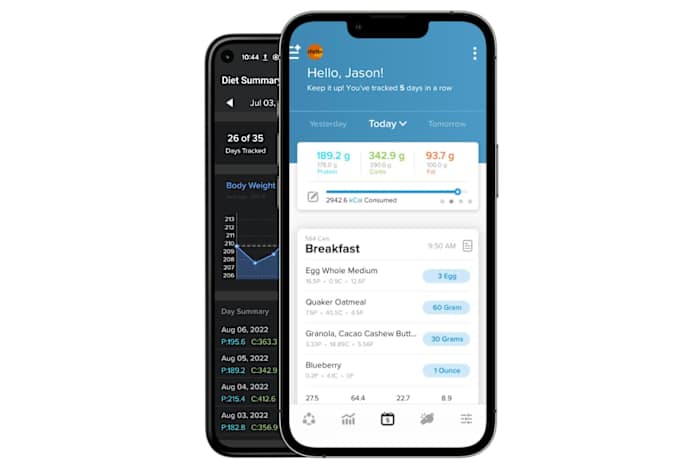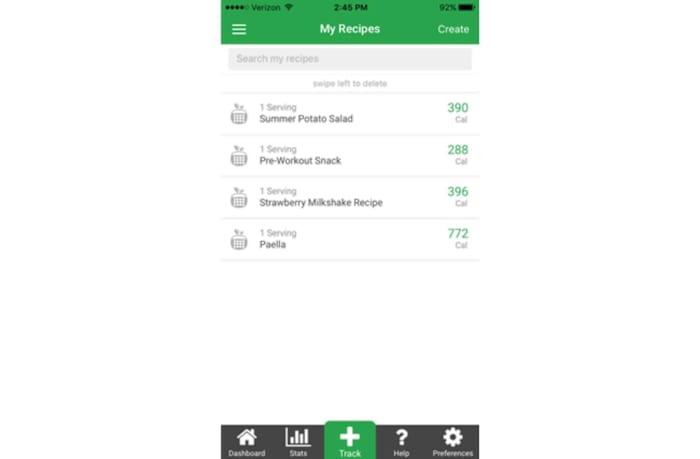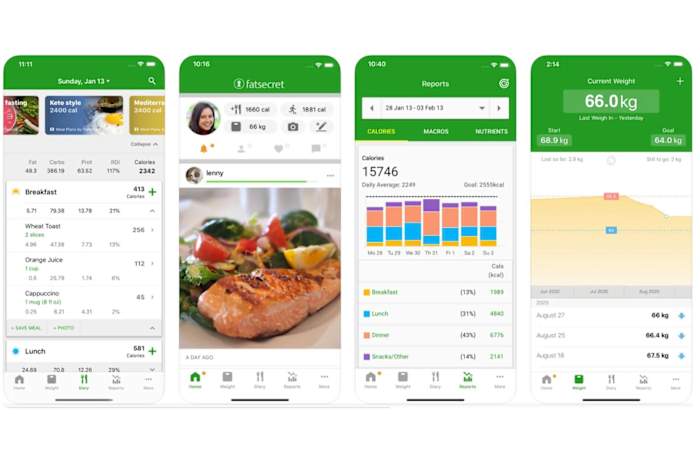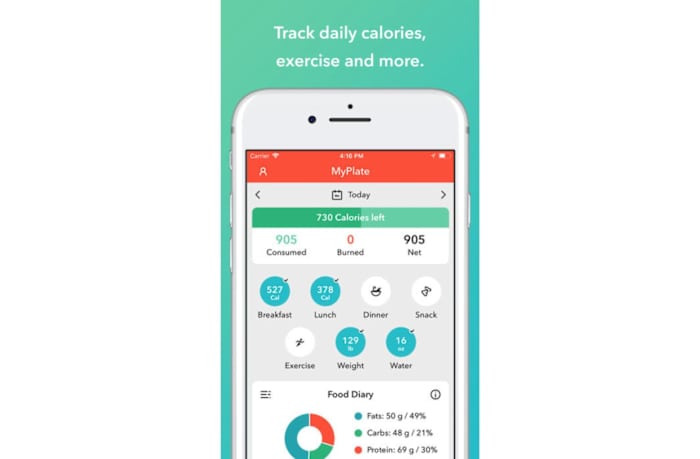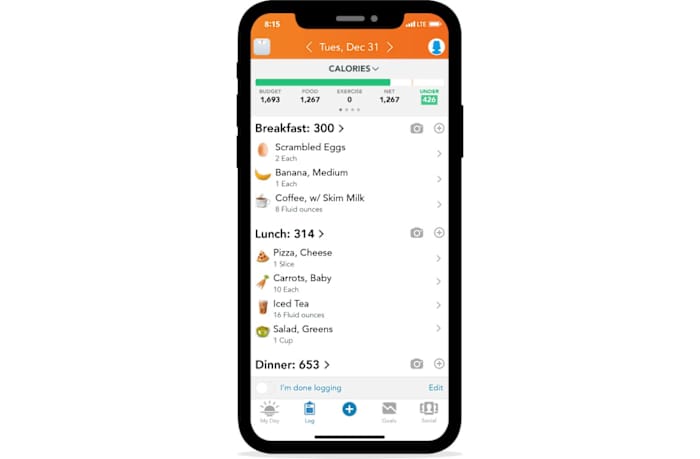The products featured in this article have been independently reviewed. When you buy something through the retail links on this page, we may earn commission at no cost to you, the reader. Sports Illustrated editorial staff are not involved in the creation of this content. Learn more here.
Our Picks for the Best Macro Tracker Apps of 2024:
- Best Overall Macro Tracker App: Cronometer
- Best Macro Tracker Alternative: Noom
- Best Meal Delivery Service to Meet Macros: Diet-to-Go
- Best Macro App for Nutrition Coaching: YAZIO
- Best Macro Tracker App for Beginners: My Macros+
- Best Database Macro Tracker App: Nutritionix Track
- Best Free Macro Tracker App: FatSecret
- Best Macro Tracker App for All Diets: MyPlate
- Best Macro Tracker to Sync with Health Apps: Lose It!
If you are working on improving your nutrition, a macro tracking app can be a perfect tool for logging your food and keeping track of what you're eating. The term macronutrients, or macros for short, refers to the three categories of nutrients we consume in the most quantity: carbohydrates, fats and proteins. Tracking macros can be a fantastic first step in learning how to eat balanced meals.
By learning to eat for your nutrition goals, you can improve athletic performance and boost your energy levels—ensuring you’re taking in the right balance of food is crucial to achieving your health and fitness goals.
In the wake of macro tracking, many great options have become available in 2024, but not all of them function similarly. We're sharing our top picks for the best macro-tracking apps in this guide, to help you make the right choice.
If you have underlying concerns like body dysmorphia, disordered eating or an eating disorder, please consult your doctor before using a macro tracker. Therapy or a more psychological approach to weight management may be needed.
Best Overall: Cronometer
Specs:
- Free, premium features for $11.99/month
- Accurate database, detailed nutrition breakdown
- Available on the iOS app store, Android and desktop
- Best for those looking for precision, accuracy and a detailed look at all of the vitamins and minerals they’re consuming
When it comes to accuracy and precision, it’s hard to beat Cronometer. They use a verified food database that doesn’t allow users to create their own public entries, so you know you’re getting accurate results when choosing a food. You can create your own custom foods and recipes, but they won’t be added to the public database.
The barcode scanner makes tracking packaged foods a breeze, and you can see very advanced breakdowns of the micronutrients you’re consuming, which are vitamins, minerals and antioxidants. The premium version allows you to track your fasting, use your own custom meal schedules and macro goals that change day to day.
Many dietitians and nutrition coaches recommend Cronometer for its accuracy, ease-of-use and detailed tracking, which is why it earned our top pick for the best on the market.
Best Macro Tracker Alternative: Noom
Specs:
- $70/month or $209/year
- Focuses on changing your mindset, rather than simply counting calories
- Available on the iOS app store, Android and desktop
- Best for those who want to focus on habits and behavior change, rather than focusing purely on macros.
While most apps focus on math, tracking your calories, nutrition and meals, Noom focuses on the psychology of behavior change, rather than simply assigning numbers.
Specifically, its aim is to improve your lifestyle habits that will help you keep long term results for a complete health solution, instead of quick fix diets that don’t last.
Every day, you’ll receive a lesson on a different food-related topic, including emotional eating, social situations, chronic stress and much more. You’ll receive a daily calorie goal, and use Noom’s built-in food tracker to log your food.
You can also use the built-in messenger to reach out to Noom coaches, but it can take them up to 24 hours to respond, and it’s not clear how often you speak to a human, vs a chatbot.
It’s not cheap, but if you’re looking to explore the mindset around food and change your habits, Noom is a great option.
Best Meal Delivery Service to Meet Macros: Diet-to-Go
Specs:
- $138.99 to $225.99 per week depending on plan and amount of meals needed
- Users select their menu online based on dietary needs
- Best for those looking for the convenience of meal delivery, and the quality of chef-prepared meals
If you’re feeling overwhelmed trying to compile recipes, groceries, or simply don’t have time to meal prep in order to meet your macros, a prepared meal delivery service may be a good choice. Diet-to-Go helps you plan out your diet each week, with chef-prepared meals that are delivered to you. This isn’t just for convenience, but to help keep you on track with your macro intake. Select between five meal plans with varied macro levels: Balance, Balance-Diabetes, Mediterranean, Keto-Carb30 and Vegetarian. You can also pick your meal frequency, opting between two to three meals a day, five to seven days a week.
Diet-to-Go created each meal plan alongside dietitians to ensure you’re getting all the nutrients you need. You can work with their in-house team, including a Registered Dietitian, Certified Health Coach and Nutritionist, by using a contact form to set up a call or email.
Best Macro App for Nutrition Coaching: YAZIO
Specs:
- Starting at $6.66/month ($3.33/month with annual subscription)
- Recipes, calorie counting, activity counting, fasting tracker all available through app
- Available on the iOS app store, Android and desktop
- Best for those looking for coaching and guidance, without hiring a real-life coach
YAZIO was initially created in Germany in 2013 by classmates Florian Weissenstein and Sebastian Weber. The app has had massive success across Europe and the United States due to its in-depth and multi-level approach to macro counting.
You’ll create a custom profile by inputting your body stats, goals and preferences, and YAZIO will provide you with macro targets, as well as an easy-to-use calorie and macro tracker. Users will have the option to track activity, intermittent fasting windows, calories, water intake and macros through the different diary inputs and tabs on the app. Premium users will have access to more in-depth tracking than free users, but all users are still able to use the tracking capabilities. In addition to tracking, YAZIO has a mood tracker (for Premium users only) and a huge library of healthy recipes, covering breakfast, lunch, dinner and snacks. These recipes can be tailored to your diet, how you prefer to cook, your calorie and macro goals and more, making it an excellent resource for those who are new to healthy cooking and eating at home. More resources are available to users, too, such as tips for counting macros in restaurants, learning how to weigh and measure food,
If you’ve ever wanted custom nutritional guidance and adjustments, without the costs of hiring a real-life macro coach, YAZIO is a fantastic option that does all the thinking and adjusting for you.
Check out our YAZIO review for more information about this popular app.
Best Macro Tracker App for Beginners: My Macros+
Specs:
- Free, Premium Features for $1.99/month
- Massive food database, easy to use, with visual graphs to summarize your progress.
- Available on the iOS app store, Android and desktop
- Best for those looking for a clean, easy to use app that’s perfect for beginners.
My Macros+ claims to be one of the only apps designed by a fitness professional, so you know it’s designed to help you reach your goals in the most efficient way possible. They want to make tracking your food simple and efficient, so you can also install the app on your iPad or Apple Watch.
You can set an unlimited number of meals, not just breakfast, lunch and dinner, and set your own customized macro goals by the gram, a feature not all apps provide. For a very low monthly fee, My Macros+ premium allows you to set up your program from a desktop computer, create unlimited meal templates and goals and provides you with a weekly diet summary for your review.
What's even better? You can connect with others who have the same fitness goals as you within the app and support each other. If you're new to tracking macros, My Macros+ is hard to beat.
Best Database Macro Tracker App: Nutritionix
Specs:
- Free
- Large database, free to use and allows you to share your diary with a coach
- Available on the iOS app store, Android and desktop
- Best for those looking for a large database, simple tracking and the ability to share with your coach.
Every good macro tracker app will include some sort of food database, Nutritionix has one of the largest databases on the market, with nearly 1 million options to log.
They have the largest grocery store database on the planet, and their team is continually adding database entries from restaurants, common foods and recipes. In fact, Nutritionix’s app is so simple, because they’re primarily focused on its database, and allow other apps to reference its database.
You’re not getting the fanciest app, but you are getting one of the biggest food databases with a simple, easy-to-use interface that gets the job done and with no hidden charges. In Nutritionix, it's hard to find a recipe or food that isn't in the database, so you can eat what you love and still stay on track with your nutrition goals.
Best Free Macro Tracker App: FatSecret
Specs:
- Free, premium features for $6.49/month
- Simple, easy to use, and most features are free
- Available on the iOS app store, Android and desktop
- Best for those looking for a quick, easy to use, free option
If you’re not looking to spend much money, FatSecret is one of the most user-friendly apps, and the free version is packed with features. The food diary is simple, and the app is geared toward fat loss.
When you create your profile, you’ll be prompted to choose your goal, and the app will calculate a calorie target for you. There are social features, recipes to browse and the premium option unlocks meal plans created by registered dietitians.
You can even take pictures of your food, and the app will automatically detect what you’re eating. Although some users report inaccurate calorie calculations, this is a great free option if you double check your math.
Best Macro Tracker App for All Diets: MyPlate
Specs:
- Free, Premium Features for $9.99/month
- Simple, easy to use for any diet type
- Available on the iOS app store, Android and desktop
- Best for those who want the flexibility to track any diet type
While many of the apps in our list focus on a balanced approach to weight loss or performance, MyPlate allows you to easily track any type of diet. You can browse from suggested recipes and meal plans and customize them to fit vegetarian diets, vegan diets, gluten-free or nearly any other type of preference.
MyPlate was built by Livestrong, and provides a comprehensive approach to health, including workout challenges, community support and health education.
The clean, simple interface allows you to easily record your food by scanning a barcode or searching the massive database and tells exactly how many remaining macros you have for the day. The built-in food suggestions are a nice touch, and both beginners and advanced dieters will love this app.
Best Macro Tracker to Sync with Health Apps: Lose It!
Specs:
- Free, Premium Features for $39.99/year
- Accurate database, easy to use, syncs with a variety of other health apps
- Available on the iOS app store, Android and desktop
- Best for those looking for a user-friendly app that pairs with your smart devices
Lose It! is one of the most popular macro tracking apps, thanks to its user-friendly interface, food database and integrations.
Its premium option allows you to sync with most other fitness apps and devices, including Apple watches, Fitbit watches and scales, Withings scales, Garmin devices and more. If you’re using other apps and devices, Lose It! is the best to automatically import your exercise data, calories burned and body weight.
With the premium plan, you’ll also receive insights based on your eating patterns and habits, helping you spot any concerning habits. At only $39.99/year, the premium plan works out to $3.33/month, one of the cheapest options on our list.
Benefits of Tracking Macros
For those new to tracking their food, tracking your macros allows you to precisely record what you’re taking in, so you can ensure you’re eating a well-balanced diet that’s right for your goals.
If you’re not tracking your food, it’s difficult to quantify how much you’re eating, like trying to stick to a budget without actually looking at your bank accounts. Tracking your macros shows you an exact picture of the nutrients you’re consuming, so you can adjust accordingly if you’re not seeing the results you want.
Many find that they’re unable to reach their fitness goals as quickly as they want, and know they should adjust their food, but if you’re not tracking, you have no idea what to adjust, or by how much.
Before apps, tracking your food required using a pen and paper log, or tracking your meals on a spreadsheet. With macro tracking apps, all you need to do is type in what you ate and how much, and the app records everything for you. You can also scan food labels with most apps, making tracking even easier.
Who Should Use a Macro Tracker
Anyone interested in optimizing their nutrition will benefit from tracking their macros. Many weight loss programs and nutrition programs help you set up calorie intake and macro targets, and a macro tracking app provides an easy way to make sure you’re hitting those targets. Macro tracking is used by athletes or competitors, or those who have very specific performance goals and need to closely track what they consume daily.
If you’re looking to count your calories or track your macros, a macro tracker app is the easiest way to consistently record your food intake.
Who Shouldn’t Use a Macro Tracker
While counting macros works, it might not be the best tool for everyone who wants to lead a healthier lifestyle.
Those who prefer to eat more intuitively, avoid logging the numbers and not be so rigid with nutrition would not benefit from using a macro tracker. Counting macros is not the only way to live a healthy lifestyle, just one tool that could be an option for you.
If you have underlying concerns like body dysmorphia, disordered eating or an eating disorder, please consult your doctor before using a macro tracker. Therapy or a more psychological approach to weight management may be needed.
Macro Tracker Apps vs Weight Loss Apps
Many people assume that you only track macros to lose weight, but this isn’t the case. Optimizing your macro intake is essential for maximum performance as well, so if you’re looking to build muscle or improve your endurance, you’ll want to track your macros and make sure you’re taking in enough fuel.
Weight loss apps tend to only focus on weight loss, while macro tracking apps allow you to record your food for any goal, even if you’re simply curious to see what you’re taking in each day.
Related Post: The Best Nutrition Tracking Apps to Help You Achieve Your Diet Goals
How To Track Your Macros
The biggest mistake that people make is not tracking their macros accurately. The whole point of macros is to have data to work with and adjust, so it’s important to be as accurate as possible.
This means measuring your food, with measuring cups or a food scale, so that you can record the precise amounts. Pre-packaged foods are easy to track, as you can simply scan the label, but for anything else you’re eating, you’ll want to measure everything you eat. Make sure you measure raw meats, dairy and vegetables before you cook them. When you cook foods with butter or oils, they can change their weight, so measure everything separately, then cook everything together, then enjoy!
While this may seem inconvenient, accurate tracking is the only way to experience the full benefits of your chosen macro tracker.
Macro Tracker App FAQs
How can I track my macros more accurately?
In order to track your macros as accurately as possible, you should make sure you log everything you eat. Throughout the day, we tend to sneak bits and treats without thinking about them because they aren't actual meals, yet they add up to a significant amount of calories.
You should not eyeball portions, but rather use a scale to determine how much you are eating. The app only knows what you tell it, and some apps offer suggestions on how to change your macros. If the data isn’t accurate, those suggestions may be inappropriate for you.
Related Post: How to Count Macros: A Complete Guide
What should my daily macros be?
There’s no one-size-fits-all approach, and quite a few different formulas and calculations you can use to calculate your starting macros. Your macros depend on not only your height and weight, but also your goals, preferences and individual needs.
Most apps include a built-in macro calculator, so all you need to do is enter your own current weight, exercise schedule and goals, and the app will help you out.
For more hands-on help, you can hire a nutrition coach or dietitian who will be able to accurately tell you the appropriate macros you should be consuming.
Does tracking macros really work?
If you’re accurately logging your food, absolutely. Your body weight is dependent on energy balance, and you gain weight if you eat more calories than you burn each, and lose weight if you eat fewer calories than you burn each day.
If you’re counting macros accurately, you can see if you’re moving toward your goal, and adjust your food intake accordingly if not.
You can even improve your body composition by tracking macros, which is the proportion of muscle to fat (and bone) in your body. Researchers have found that those who consume more protein than carbohydrates and fats have higher lean mass and lower levels of body fat.
What is the best macro ratio for fat loss?
This will be very individual and based on your preferences and activity levels. In general, even the best calculations and formulas only provide an educated guess and a good starting point. Some do better with more carbohydrates, while some do better with a low-carb approach like the keto diet. Both can work, and it’s largely a matter of which works best with your lifestyle.
You’ll want to choose a set of macros to start with, hit them consistently for at least two weeks, and then you’ll be able to see how your body is responding, and adjust your macros accordingly.
Should I count calories or track macros?
Whether you should count calories or track macros depends on what your goals are and how precise you want to be when it comes to your nutrition. Technically speaking, if you’re tracking your macros, you are also counting calories—all calories are made up of the three major macronutrients and alcohol, which provides empty calories with no nutritional value.
If you want to have a little bit more flexibility with your diet, you can count overall calories. In this case, you might not know how much protein, carbs or fats you are consuming. But, if you’re just a beginner, it's a good first step in showing you how much food you need.
Some use a modified approach: tracking total calories with a minimum protein target. This is great for those who are trying to put on muscle size, as studies have proven time and time again that higher protein consumption is advantageous for muscle mass. Tracking macros is more precise, but counting your calories is easier, which may be a better fit for those new to tracking their food.
Related Post: How Calorie Calculators Can Help You Lose Weight?
Final Thoughts
Tracking your macros is an efficient way to optimize your nutrition, lose weight or simply be more mindful of what you're eating. It takes work, but the apps on our list will make tracking your macros as easy and convenient as possible. When you're familiar with how to track macros, choose the app that feels best for your goals, and you'll soon be achieving your health goals!
Prices are accurate and items in stock as of publish time.

